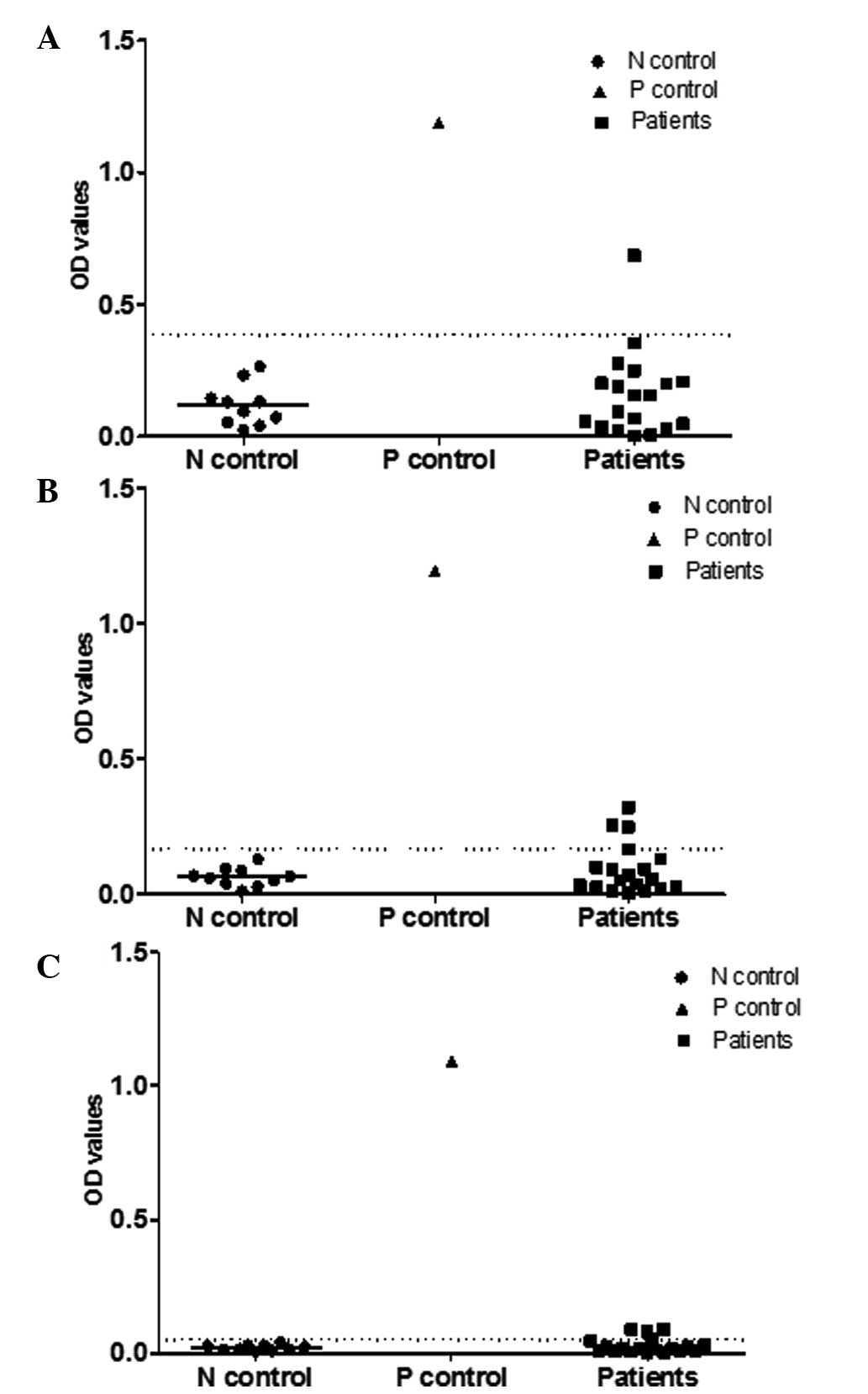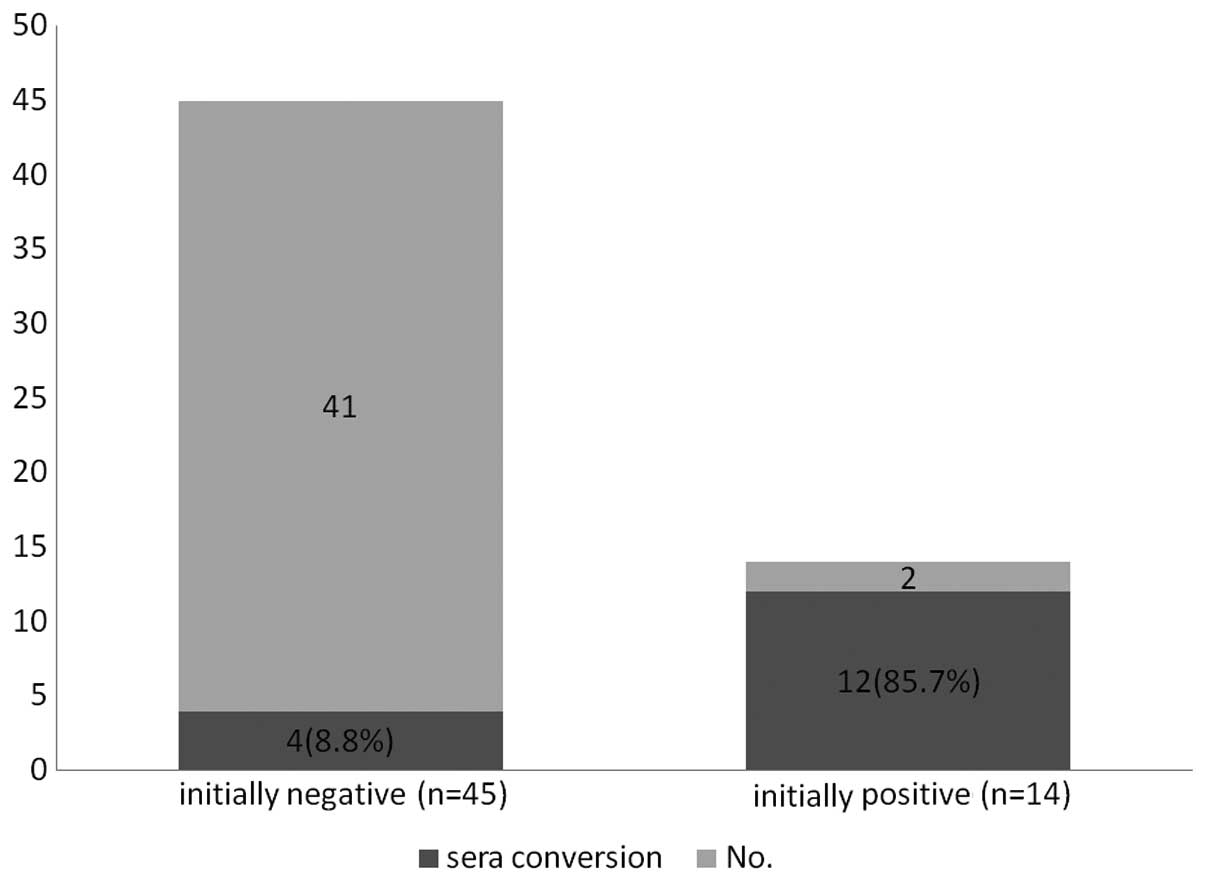|
1
|
Siegel R, DeSantis C, Virgo K, et al:
Cancer treatment and survivorship statistics, 2012. CA Cancer J
Clin. 62:220–241. 2012. View Article : Google Scholar : PubMed/NCBI
|
|
2
|
Jemal A, Siegel R, Ward E, et al: Cancer
statistics, 2007. CA Cancer J Clin. 57:43–66. 2007. View Article : Google Scholar
|
|
3
|
Lei T, Chen WQ, Zhang SW, et al:
Prevalence trend of colorectal cancer in 10 cities and counties in
China from 1988 to 2002. Zhonghua Zhong Liu Za Zhi. 31:428–433.
2009.(In Chinese).
|
|
4
|
Li HL, Gao YT, Zheng Y, et al: Incidence
trends of colorectal cancer in urban Shanghai, 1973–2005. Zhonghua
Yu Fang Yi Xue Za Zhi. 43:875–879. 2009.(In Chinese).
|
|
5
|
He J, Gu D, Wu X, et al: Major causes of
death among men and women in China. N Engl J Med. 353:1124–1134.
2005. View Article : Google Scholar : PubMed/NCBI
|
|
6
|
Scanlan MJ, Gure AO, Jungbluth AA, et al:
Cancer/testis antigens: an expanding family of targets for cancer
immunotherapy. Immunol Rev. 188:22–32. 2002. View Article : Google Scholar : PubMed/NCBI
|
|
7
|
Jager E, Chen YT, Drijfhout JW, et al:
Simultaneous humoral and cellular immune response against
cancer-testis antigen NY-ESO-1: definition of human
histocompatibility leukocyte antigen (HLA)-A2-binding peptide
epitopes. J Exp Med. 187:265–270. 1998. View Article : Google Scholar
|
|
8
|
Stockert E, Jager E, Chen YT, et al: A
survey of the humoral immune response of cancer patients to a panel
of human tumor antigens. J Exp Med. 187:1349–1354. 1998. View Article : Google Scholar : PubMed/NCBI
|
|
9
|
Mackensen A, Meidenbauer N, Vogl S, et al:
Phase I study of adoptive T-cell therapy using antigen-specific
CD8+ T cells for the treatment of patients with
metastatic melanoma. J Clin Oncol. 24:5060–5069. 2006. View Article : Google Scholar : PubMed/NCBI
|
|
10
|
Gnjatic S, Nishikawa H, Jungbluth AA, et
al: NY-ESO-1: review of an immunogenic tumor antigen. Adv Cancer
Res. 95:1–30. 2006. View Article : Google Scholar : PubMed/NCBI
|
|
11
|
Jäger E, Stockert E, Zidianakis Z, et al:
Humoral immune responses of cancer patients against ‘Cancer-Testis’
antigen NY-ESO-1: correlation with clinical events. Int J Cancer.
84:506–510. 1999.
|
|
12
|
Kurashige T, Noguchi Y, Saika T, et al:
Ny-ESO-1 expression and immunogenicity associated with transitional
cell carcinoma: correlation with tumor grade. Cancer Res.
61:4671–4674. 2001.PubMed/NCBI
|
|
13
|
Nakada T, Noguchi Y, Satoh S, et al:
NY-ESO-1 mRNA expression and immunogenicity in advanced prostate
cancer. Cancer Immun. 3:102003.PubMed/NCBI
|
|
14
|
Marzouk O and Schofield J: Review of
histopathological and molecular prognostic features in colorectal
cancer. Cancers (Basel). 3:2767–2810. 2011. View Article : Google Scholar : PubMed/NCBI
|
|
15
|
Chen YT, Scanlan MJ, Sahin U, et al: A
testicular antigen aberrantly expressed in human cancers detected
by autologous antibody screening. Proc Natl Acad Sci USA.
94:1914–1918. 1997. View Article : Google Scholar : PubMed/NCBI
|
|
16
|
Wang Y, Wu XJ, Zhao AL, et al:
Cancer/testis antigen expression and autologous humoral immunity to
NY-ESO-1 in gastric cancer. Cancer Immun. 4:112004.PubMed/NCBI
|
|
17
|
Chen HS, Qin LL, Cong X, et al: Expression
of tumor-specific cancer/testis antigens in hepatocellular
carcinoma. Zhonghua Gan Zang Bing Za Zhi. 11:145–148. 2003.(In
Chinese).
|
|
18
|
Kim SH, Lee S, Lee CH, et al: Expression
of cancer-testis antigens MAGE-A3/6 and NY-ESO-1 in non-small-cell
lung carcinomas and their relationship with immune cell
infiltration. Lung. 187:401–411. 2009. View Article : Google Scholar : PubMed/NCBI
|
|
19
|
Ries J, Mollaoglu N, Vairaktaris E, et al:
Diagnostic and therapeutic relevance of NY-ESO-1 expression in oral
squamous cell carcinoma. Anticancer Res. 29:5125–5130.
2009.PubMed/NCBI
|
|
20
|
Li M, Yuan YH, Han Y, et al: Expression
profile of cancer-testis genes in 121 human colorectal cancer
tissue and adjacent normal tissue. Clin Cancer Res. 11:1809–1814.
2005. View Article : Google Scholar : PubMed/NCBI
|
|
21
|
Scanlan MJ, Welt S, Gordon CM, et al:
Cancer-related serological recognition of human colon cancer:
identification of potential diagnostic and immunotherapeutic
targets. Cancer Res. 62:4041–4047. 2002.PubMed/NCBI
|
|
22
|
Wu AW, Gu J, Ji JF, et al: Role of COX-2
in carcinogenesis of colorectal cancer and its relationship with
tumor biological characteristics and patients’ prognosis. World J
Gastroenterol. 9:1990–1994. 2003.
|
|
23
|
Yarbro JW, Page DL, Fielding LP, et al:
American Joint Committee on Cancer prognostic factors consensus
conference. Cancer. 86:2436–2446. 1999. View Article : Google Scholar : PubMed/NCBI
|
|
24
|
Jass JR, Love SB and Northover JM: A new
prognostic classification of rectal cancer. Lancet. 1:1303–1306.
1987. View Article : Google Scholar : PubMed/NCBI
|
|
25
|
Jager E, Gnjatic S, Nagata Y, et al:
Induction of primary NY-ESO-1 immunity: CD8+ T
lymphocyte and antibody responses in peptide-vaccinated patients
with NY-ESO-1+ cancers. Proc Natl Acad Sci USA.
97:12198–12203. 2000.PubMed/NCBI
|
|
26
|
Yuan J, Adamow M, Ginsberg BA, et al:
Integrated NY-ESO-1 antibody and CD8+ T-cell responses
correlate with clinical benefit in advanced melanoma patients
treated with ipilimumab. Proc Natl Acad Sci USA. 108:16723–16728.
2011.PubMed/NCBI
|
|
27
|
Tsuji T and Gnjatic S: Split T-cell
tolerance as a guide for the development of tumor antigen-specific
immunotherapy. Oncoimmunology. 1:405–407. 2012. View Article : Google Scholar : PubMed/NCBI
|
















